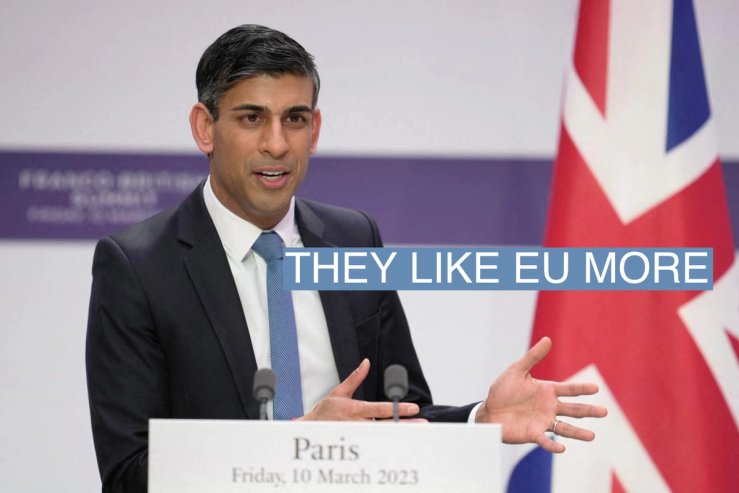The News
Britons’ approval of the European Union’s leadership surpassed 50% for the first time last year, according to a newly released Gallup poll.
The shift in opinion comes more than six years after the historic Brexit referendum when U.K. citizens voted to leave the EU. The poll also showed that more Britons approve of EU leaders over their own country’s government.
Here are more findings from the Gallup poll:
- 51% approved of EU leadership compared to 47% who disapproved.
- 46% approved of the U.K.’s leadership, a rating which has rebounded from the Theresa May years at the onset of the pandemic in 2020.
- Approval of the EU has risen fastest among groups that were the most ardent pro-Brexit supporters, including people in rural areas (54%) and people aged 50 and older (55%).
Know More
The Gallup poll was administered to 1,000 respondents between May and June last year, shortly after former Prime Minister Boris Johnson’s COVID “partygate” scandal, and right before his subsequent resignation on July 7.
Previous data shows that approval for EU leadership has been steadily growing over the past several years, and continued to do so even after the 2016 referendum.
Benedict Vigers, one of the authors of the study, told Semafor that the new poll is more telling than previous ones given that U.K.-EU relations is a major issue as the country figures out post-Brexit trade and immigration deals.
“There are very real questions about what the future relationship between us and our European neighbors will look like for the next 5, 10, 20 years,” he said. “I think this finding of majority E.U. approval in the U.K. is a salient one.”
He added that although the poll was conducted early last year, subsequent political blowback — namely Liz Truss’ chaotic 50-day tenure that sent financial markets spiraling — made him believe that there was nothing “substantial” to suggest that the EU approval trend would have dropped dramatically.
The shift to increasing EU approval was driven by those in rural areas and people aged 50 and over — groups that were traditionally more negative about the EU. A contributing factor to this change in attitude, the poll’s researchers say, may have been the numerous scandals that plagued Boris Johnson — the face of the Vote Leave campaign. His approval ratings fall sharply in 2022 among the pro-Brexit public who had voted him into power.
Step Back
Since the U.K.’s split from the E.U. in 2020, lawmakers have faced numerous challenges in adapting the country to a post-Brexit economy and society.
Some progress was made last month when Prime Minister Rishi Sunak’s government unveiled a new trade agreement for Northern Ireland, addressing “burdensome customs bureaucracy” for goods originating from Britain.
Sunak has also vowed to crack down on illegal immigration, one of the key motivators for many pro-Brexit lawmakers. The U.K. is offering France millions of pounds to ramp up border protection on its northern coast to prevent migrants from crossing the English Channel, a move that EU leaders have condemned.


